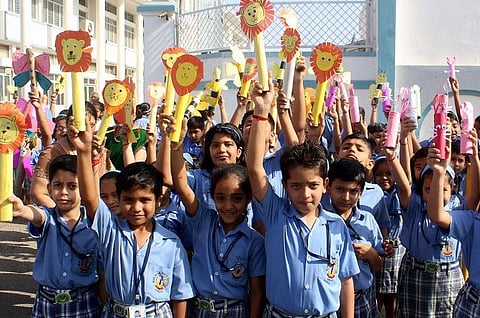

Many parents who belong to marginalised sections of society, or earn less than Rs 2 lakh per annum in Tamil Nadu, were in for a shock recently when they tried to file a school application under the Right To Education (RTE) quota for their children. In most districts, they found CBSE schools missing from the list of schools with RTE quota seats, pushing them to give up their dreams of enrolling their children in CBSE schools. The reason? Several CBSE schools are allegedly evading the RTE rules by conducting their admissions before the official RTE schedule.
While the state government claims to be taking steps to address this issue, authorities are wary about the inaction by the Central Board of Secondary Education (CBSE), the regulatory body which sets rules for CBSE schools across the country.
In Tamil Nadu, all private unaided schools are compulsorily required to allocate 25% of the total available seats in entry level classes (Kindergarten and Class 1) for students from marginalised sections of the society. Essentially this includes children from socially and economically disadvantaged families, children of HIV+ parents, children with parents who work as scavengers, and children with physical disabilities.
The process for applying for one of the schools for RTE quota seats was made fully online this year (for academic year 2019-20) in Tamil Nadu. The online application process in Tamil Nadu started on April 22 and ended on May 18. It was during this period that many parents discovered that the CBSE schools in their districts did not show up on the list of schools with RTE allocation in the application form. This prompted many parents to call various NGOs and volunteer organisations to figure out the reason for such a lapse.
Speaking to TNM about this, Saravanan, a volunteer with Bhumi, an NGO that works in the RTE domain in Tamil Nadu, said that the organisation’s helpline was buzzing with scores of calls, all from worried parents who could not find the CBSE school of their preference in the RTE application website.
“All these years, CBSE schools and a lot of private matriculation schools have dodged RTE norms because of reimbursement issues from the government. This year, based on information we got from the Directorate of Matriculation Schools in Chennai, CBSE schools stayed away from RTE admissions because they apparently have closed their admissions by February itself,” he explained.
Confirming this, Dr S Kannappan, the Director of Matriculation Schools, Tamil Nadu told TNM that CBSE schools have stayed out of RTE all this while because they claim to complete admissions by March.
“We have taken this up with the CBSE many times and every time the board tells us that it is the prerogative of the schools to do so, and that they have no control over it. The term ‘private unaided school’ given in the act includes all schools – be it matriculation or CBSE – and hence the schools closing the admissions way before the set deadline is not correct,” he said.
Adding that this year the state government has initiated process to bring CBSE schools in Tamil Nadu within the ambit of RTE quota, Kannappan said that moving forward the process will be regularised. “This year itself the district educational officers have submitted a special report on this violation to us. We will study it and do the needful so that the students are not losing out on their rightful education,” he said.
Tamil Nadu government’s order on RTE admissions has prescribed tentative timelines for all the schools which conduct RTE admissions. According to the information published on the Department of School Education website of the government of Tamil Nadu, the tentative timeline for RTE admissions start from April 2 every year when the schools prepare an intake capacity report, and end on or before May 29 every year.
Going by this timeline, the process of CBSE schools completing 100% admissions by February or even March every year is a violation of the RTE norms in the state, activists say.
Despite multiple attempts on call and messages, CBSE officials could not be reached for a comment.